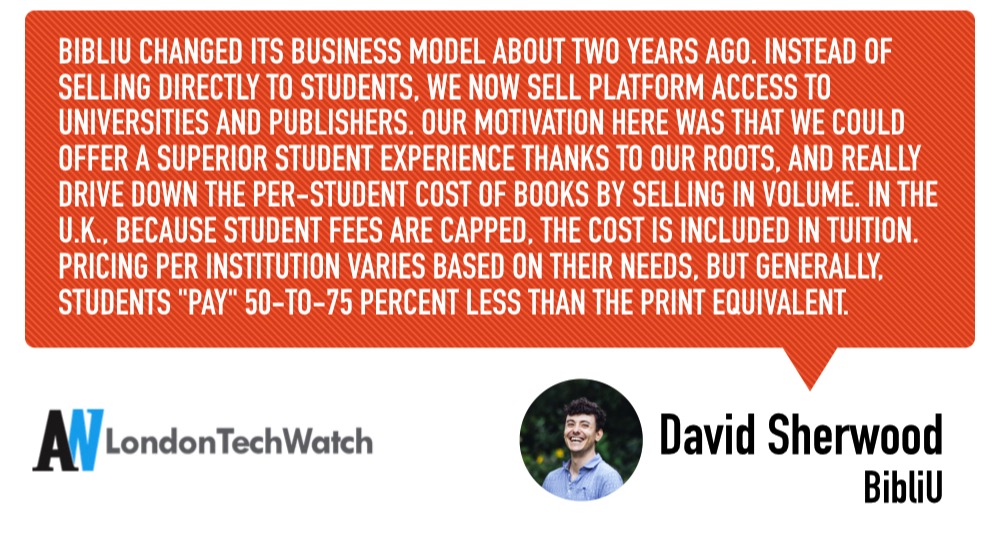A 2014 report from the US PIRG Education Fund reveals that 65% of students decided against purchasing a textbook because it was too expensive. Since an individual textbook can easily cost upwards of £100, college students are looking at online solutions such as BibliU, which gives students access to eTextbook and other reading materials at a cost that’s 50-75 percent less than the print version. BibliU’s online learning experience has annotation features allowing students to virtually highlight and take notes, and its Discovery Search gives students the ability to find content from the entire institutional catalog, instead of being limited to their assigned book. While BibliU has plenty of great features for students, it also provides universities and institutions with data insights to understand how students are learning and the ROI. BibliU works with universities such as Coventry University, Oxford Imperial, and University of Lincoln.
London TechWatch interviewed David Sherwood to learn more about BibliU’s mission, plans to expand into the US market, and recent funding round. BibliU has now raised $15.6M across six rounds since its founding 2015.
London TechWatch: Who were your investors and how much did you raise?
David Sherwood, BibliU: This is a Series A investment of $10M. The investment was led by Nesta Impact Investments and included Guinness Asset Management, direct investment clients of Stonehage Fleming, and ClearlySo.
Tell us about your product or service.
BibliU is a digital learning platform that makes textbooks and reading materials more accessible and makes learning more effective. We do this by enhancing publisher materials with things like instant search across the entire library, text-to-speech, and mobile apps that sync your notes automatically.
The platform works with the learning management systems and single sign-on systems used by higher-ed institutions and businesses to simplify content distribution. It also provides data analytics to show universities how much of a book students read and how well they grasp the material, as well as return on investment for providing the materials to students.
 What inspired the start of BibliU?
What inspired the start of BibliU?
When I was studying at Oxford and the University of Western Australia, it was incredibly frustrating that my textbooks cost so much. They were always “on-top” of my tuition costs, so my scholarship and my student loans wouldn’t cover the books. I also found it annoying that everything else in my life – Spotify, Netflix, News – was online, but the library and my textbooks weren’t. Walking to the library to get out six, 2kg books, and walk home with them was the last thing I wanted to do in the middle of my study sessions. So really, it was a mixture of wanting convenience and a modern experience, and the incredible cost of textbooks to go away. We’ve managed to do that for over 100,000 students, which is pretty satisfying.
How is BibliU different?
The main differentiator for BibliU is Discovery Search; it’s a Google-like search experience that gives students the ability to find content not just from inside their assigned book, but across the entire institutional catalog. It’s powered by a constantly evolving algorithm to serve up relevant content to each student to make learning more effective.
From the institution’s perspective, BibliU makes it more efficient to deliver content to students. Our analytics shows institutions how content is performing and allows them to make data-driven decisions about what to keep in the catalog. BibliU gives universities and academics the power to decide what content is right for them, regardless of whether it is a textbook, courseware, OER, or another format – without sacrificing consistency of learning experience – because it’s all in the same place.
What market is BibliU targeting and how big is it?
The global educational content sector is a $65B industry. We’re targeting universities in the U.S., U.K., and Europe with plans to expand further. Right now, we serve about 40 paying universities in Europe and four in the U.S. About 100 universities are on free pilots as we’ve offered to help their digital transformation brought on by COVID-19. We work with more than 2,000 publishers. The regional markets are very different in size and need, but we’re working on building out relationships in both regions.
Who do you consider to be your primary competitors?
ProQuest, VitalSource, and EBSCO.
What’s your business model?
BibliU changed its business model about two years ago. Instead of selling directly to students, we now sell platform access to universities and publishers. Our motivation here was that we could offer a superior student experience thanks to our roots, and really drive down the per-student cost of books by selling in volume. In the UK, because student fees are capped, the cost is included in tuition. Pricing per institution varies based on their needs, but generally, students “pay” 50-to-75 percent less than the print equivalent. It keeps everyone in the ecosystem, BibliU, publishers, students, and the university happy.
What was the funding process like?
We’ve learned from previous funding that starting early is the key to finding investors that we’re happy with. Not long after our previous raise, we knew we’d be pushing for another so we only “rested” for about 6 months. We know the ebb and flow of our business pretty well now, and there’s been a pretty heavy alignment to semester start dates for sales. This is changing now. In the U.S., you have major online universities that offer 5-week rolling starts, which changes the revenue cycle – so our growth would happen in big “jumps,” which gave us something to go back to interested investors with and prove the opportunity that BibliU offered.
What are the biggest challenges that you faced while raising capital?
The EdTech industry is exciting because we’re in one of the few sectors that really needs some fresh energy and has such a positive impact on society. It’s a challenge because of the aforementioned sales cycles. We never want to sell investors on an unrealistic “vision” because we want them to understand the way the industry operates. This can sometimes require a lot of education and due diligence, but we’re better for it as a business, and now have some fantastic backers who bring a wealth of knowledge to us as well.
What factors about your business led your investors to write the check?
It’s been a mixture, I think at the crux of it, we have several supportive customers who are willing to get behind us and offer their experience. Ian Dunn, the Provost of Coventry University, spoke to EdSurge for us last week, for example. That goes a long way in instilling confidence in our product-market fit. We’ve also got the revenue figures to back our growth and expansion, along with several prospects that are looking positive for us, and, again, were kind enough to speak to prospective investors.
In the current climate, we’re fortunate to be in a position where we can help universities move online. So far, 100 or so universities have taken up our offer of free textbook access. As plenty of reports have shown, the crisis has spurred on a number of shifts to more heavy reliance on online resources, including education. We hope that the change will accelerate, making education more accessible to remote learners.
What are the milestones you plan to achieve in the next six months?
We’re trying to make this whole digital transformation process easier for universities to support remote learners. Which means we’re investing in making the distribution and procurement process much easier for them. We’ve already got some pretty significant operational advantages over our competitors, and we want to continue saving universities more time and making them more efficient.
One of our long-term, impact goals is making content fully accessible to all students, whether that accessibility is from a financial perspective or a disability. Universities are catching onto the opportunity that EdTech offers in terms of accessibility; there are some industry-led initiatives like ASPIRE, which was created by JISC. We’ll be announcing our results from our ASPIRE audit very soon, as we’ve been focusing heavily on improving our accessibility.
Our revenue targets are pretty ambitious, but we have an amazing team. We want to hit $7M ARR this year and reach profitability in the coming years.
What advice can you offer companies in London that do not have a fresh injection of capital in the bank?
We feel pretty fortunate to be in this position right now and be able to focus on the business, rather than our finances. The government has introduced a number of initiatives to assist growing companies, which I think is the right move because we will eventually return to a new normal. It’s important that small businesses survive the current crisis.
From our perspective, I think our approach of being realistic with investors has given us a group who trust where we’re headed. For companies that are looking down the equity capital route, I think there’s still a lot of funding to be found in London. If you’ve got a business with solid fundamentals and the right model, people are still interested; it just takes a fair bit of effort to find them.
From our perspective, I think our approach of being realistic with investors has given us a group who trust where we’re headed. For companies that are looking down the equity capital route, I think there’s still a lot of funding to be found in London.
Nesta was our lead, and they’re our lead because they see the impact we offer to society, that alignment of our goals and their goals is the perfect combination – look for that alignment in your investors. They are more likely to stick with you through uncertain periods.
Where do you see the company going now over the near term?
We have some strong opportunities in the States, so I’m hopeful we’ll have a flagship account there soon. This is going to change the company dramatically, and we’re ramping up our operations there in preparation. In the U.K., Coventry is already looking at expanding our current program with them, which is fantastic news. More broadly, we have a tremendous opportunity to help a sector that, for the last four years, we’ve been working closely with, to get through the ongoing crisis.
We’re making some considered hires to bolster our teams and keep our margin growth closely aligned with revenue growth. We keep our product improvements closely tied with what we see the market needs to have addressed. The student side of the product is evolving every week based on direct feedback, and we’re working closely with institutions to build out features that make them work more efficiently. Sometimes these are custom, sometimes we see a trend and roll out solutions that work for everyone, like self-serve purchasing and deployment.
What is your favorite restaurant in London?
Fortunately, my tastes have improved since the early days of BibliU, but I’ll give a shout out to Chick Cottage in Walthamstow. There’s a little restaurant that does an incredible mixture of cuisines called Black Axe Mangal near Highbury & Islington.
You are seconds away from signing up for the hottest list in LondonTech! Join the millions and keep up with the stories shaping entrepreneurship. Sign up today





